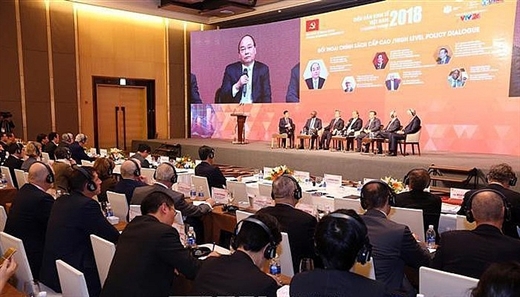Australia supports Economic Reform in Vietnam (Aus4Reform)
- en
- News and Media
- Aus4Reform News
- Vietnam Economic Forum 2019 seeks new drivers for sustainable growth
21/1/2019
Vietnam Economic Forum 2019 seeks new drivers for sustainable growth
International organisations have gathered at the Vietnam Economic Forum 2019 to discuss the potential key drivers that could maintain Vietnam's rapid and sustainable economic development in a fast-changing world.
Vietnam Economic Forum 2019 seeks new drivers for sustainable growth
International organisations have gathered at the Vietnam Economic Forum 2019 to discuss the potential key drivers that could maintain Vietnam's rapid and sustainable economic development in a fast-changing world.
 |
| PM Nguyen Xuan Phuc attended the VEF 2019 |
The Vietnam Economic Forum (VEF), organised by the Central Economic Commission and some co-organised units such as the Australian Programme to support Vietnam's economic reform (Aus4Reform Program), opened on January 16-17, 2019 under the witness of Prime Minister Nguyen Xuan Phuc and over 250 delegates from government agencies, domestic and international businesses, and international organisations.
Themed “Strengthening the fundamental drivers for rapid and sustainable economic development,” VEF 2019 looked into opportunities as well as the difficulties and challenges facing the Vietnamese economy.
"In 2018, Vietnam's economic growth reached the record high of 7.08 per cent since 2008. Many economic indicators surpassed the targets to break records. In particular, the country's export turnover hit $245 billion, up 13.7 per cent. Vietnam also attracted $35.5 billion worth of FDI, while its FDI disbursement reached an impressive $19.1 billion, up 19.1 per cent," said Nguyen Van Binh, head of the Central Economic Commission.
"Despite the achievements, the country is facing a number of challenges. The enforcement of free trade agreements bring about both challenges and opportunities. Thus, in the next-generation FDI strategy, it is necessary to clarify the priorities. How can we boost linkages between Vietnamese and FDI firms, thus enabling Vietnamese firms to join global supply and value chains? What should Vietnam do to tap into opportunities from the digital economy? How can we create more favourable conditions for the sustainable development of the private sector and how can we promote innovation among businesses?" he asked.
The event included a plenary session and high-level policy dialogue, and three thematic workshops on the financing and governance of infrastructure development; climate change adaptation and energy security for sustainable development; and opportunities and challenges for Vietnam’s digital economy in the context of Industry 4.0.
Notable, the next-generation FDI attraction strategy in 2020-2030 attracted recommendations from international organisations. According to Kyle Kelhofer, country manager of the International Finance Corporation (IFC) Cambodia, Lao PDR, and Vietnam, the country's short-term priorities should be manufacturing, services, agriculture, and tourism which are critical to strengthening local value-addition and competitiveness.
In particular, in manufacturing, the focuses should be high-grade metals/minerals/chemicals/plastics and high-tech components, industrial machinery and equipment. In services, these are logistics as well as maintenance repairs, and overhaul, while in agriculture, Vietnam should focus on high-value innovative agricultural products. In tourism, the priority should be high-value niche tourism services.
Kyle Kelhofer also added that to beat competition, Vietnam's short-term priorities should be manufacturing (automotive and transport equipment) and environmental technologies (equipment for wind, solar, and water conservation).
To align with sector liberalisation and skills development, the country’s medium-term priorities should focus on manufacturing (pharmaceuticals and medical equipment), services (IT and knowledge services, KPO-accounting and design, financial services/fintech, as well as education and healthcare services).
"It should be highlighted that these sectors are not the only ones Vietnam should welcome and attract FDI into, they require pro-active targeting and promotion to win FDI in the right segments based on alternative location options available to these investors and the finite resources available at the central investment management agency and its provincial counterparts," said Kyle Kelhofer.
"In a fast-changing world, few people would have predicted even 10 years ago how technology would impact traditional sectors and create new industries. The exponential growth of sectors like Fintech, wearable technology, artificial intelligence, robotics, drones, and the impact of disruptive technologies are all evidence that continuous ‘market sensing’ and agility are required to stay competitive as an FDI destination, including an ability to create conditions for new industries to flourish in Vietnam," he added.
Bruno Angelet, ambassador, head of the EU Delegation to Vietnam, talked about the EU's green transition and lessons for Vietnam to green out the economy to boost economic growth.
"To succeed in green transition,Vietnam should also try to walk on three legs, combining energy efficiency, energy mix, and renewable energy. However, no one expects Vietnam to just copy Europe's model. Vietnam needs its own, calibrated strategy," said Bruno Angelet.
According to international experts, Vietnam is an FDI success story. In 2016, FDI into Vietnam exceeded inflows into every other ASEAN country, except Singapore. As a percentage of GDP, Vietnam's FDI inflows already exceed those of China and India (and all large ASEAN countries, except Malaysia). 2017 also witnessed Vietnam post a record in FDI disbursement ($17.5 billion), against a backdrop of a 23 per cent global decline in FDI flows.
To avoid the middle-income trap and achieve high-income status, it is clear that Vietnam requires a next-generation FDI strategy to leverage value-added and FDI spillover effects to unlock the benefits of FDI. To take this important next step, Vietnam has been working on the next-generation FDI strategy looking at 2030. The draft strategy is expected to be submitted to the Politburo for approval in April 2019.

